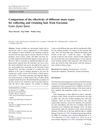 82 citations,
March 2012 in “Development”
82 citations,
March 2012 in “Development” Drosha and Dicer are essential for hair follicle health and preventing DNA damage in skin cells.
 29 citations,
December 2016 in “The EMBO Journal”
29 citations,
December 2016 in “The EMBO Journal” Gata6 is important for protecting hair growth cells from DNA damage and keeping normal hair growth.
 4 citations,
March 2012 in “European journal of wildlife research”
4 citations,
March 2012 in “European journal of wildlife research” Wire brush snares are best for collecting Eurasian Lynx hair for DNA analysis.
1 citations,
September 2023 in “Genes” DNA methylation likely doesn't cause different lambskin patterns in Hu sheep.
 1 citations,
July 2023 in “Journal of Animal Science and Biotechnology”
1 citations,
July 2023 in “Journal of Animal Science and Biotechnology” The SOSTDC1 gene is crucial for determining sheep wool type.
 December 2022 in “IntechOpen eBooks”
December 2022 in “IntechOpen eBooks” Forensic DNA Phenotyping accurately predicts physical traits and is used in investigations, but needs more diverse population data for confirmation.
 May 2022 in “Clinical Epigenetics”
May 2022 in “Clinical Epigenetics” A mother's iron levels early in pregnancy can influence the DNA makeup of her child, potentially affecting the child's health.
August 2022 in “International Journal of Molecular Sciences” DNA methylation controls lncRNA2919, which negatively affects hair growth.
 January 2016 in “Human & Experimental Toxicology”
January 2016 in “Human & Experimental Toxicology” A specific DNA sequence caused hair loss in male mice by activating immune cells and increasing a certain immune signal.
 19 citations,
March 2012 in “Journal of experimental botany”
19 citations,
March 2012 in “Journal of experimental botany” Arabidopsis collet hairs are good for studying nuclear movement and DNA content increase during growth.
 6 citations,
July 2023 in “Nature cell biology”
6 citations,
July 2023 in “Nature cell biology” SOX9 helps determine stem cell roles by interacting with DNA and proteins that control gene activity.
 688 citations,
June 2007 in “Cell Stem Cell”
688 citations,
June 2007 in “Cell Stem Cell” Removing the ATR gene in adult mice causes rapid aging and stem cell loss.
 215 citations,
March 2018 in “Archives of Toxicology”
215 citations,
March 2018 in “Archives of Toxicology” Tiny pollution particles called PM2.5 can harm skin cells by causing stress, damage to cell parts, and cell death.
 60 citations,
February 2013 in “Cell reports”
60 citations,
February 2013 in “Cell reports” The balance between androgen receptor and p53 is crucial for sebaceous gland differentiation.
 14 citations,
October 2020 in “Scientific reports”
14 citations,
October 2020 in “Scientific reports” Hair greying is linked to reduced ATM protein in hair cells, which protects against stress and damage.
 9 citations,
April 2018 in “Journal of trace elements in medicine and biology”
9 citations,
April 2018 in “Journal of trace elements in medicine and biology” Hair analysis can show nutritional status and environmental exposure, with phosphorus being very stable in hair and differences found based on gender and conditions like depression and autism.
 3 citations,
January 2018 in “Reproduction, Fertility and Development”
3 citations,
January 2018 in “Reproduction, Fertility and Development” Birth control pills increase certain receptor activities in female gerbil prostate glands and can lead to prostate changes.
 February 2024 in “New phytologist”
February 2024 in “New phytologist” DNA changes in tetraploid wheat improve root growth and nitrogen use.
 January 2010 in “Yearbook of Endocrinology”
January 2010 in “Yearbook of Endocrinology” Two new compounds can block androgen receptor activity in different ways and may lead to new treatments for androgen-related diseases.
 6 citations,
May 2014 in “Biomarkers and Genomic Medicine”
6 citations,
May 2014 in “Biomarkers and Genomic Medicine” Charnoly bodies could be a marker for cell damage, and certain nutrients and proteins might prevent them, potentially helping with brain diseases and cancer.
1 citations,
October 2023 in “Animals” Certain DNA regions in alpacas are linked to fiber diameter.
 1 citations,
December 2004 in “Hepatology”
1 citations,
December 2004 in “Hepatology” Tenofovir is more effective than adefovir for resistant hepatitis B, Fibroscan is good for assessing liver damage, regulatory T cells may help hepatitis C persist, and other insights into liver health and disease were found.
 19 citations,
November 2018 in “Nutrients”
19 citations,
November 2018 in “Nutrients” Annurca apple extract may protect mouse hair from damage by chemotherapy and could help treat hair loss without promoting cancer growth.
 7 citations,
June 2021 in “Cell Proliferation”
7 citations,
June 2021 in “Cell Proliferation” Low oxygen levels improve the function of hair and skin cells when they are in direct contact.
 May 1991 in “Current problems in dermatology”
May 1991 in “Current problems in dermatology” Skin issues can indicate immune system problems.
148 citations,
October 2008 in “The journal of investigative dermatology/Journal of investigative dermatology” Mice without the vitamin D receptor are more prone to UV-induced skin tumors.
107 citations,
March 2014 in “BoneKEy Reports” Mutations in the vitamin D receptor cause hereditary vitamin D-resistant rickets, leading to poor bone health and requiring high calcium doses for treatment.
 21 citations,
January 2022 in “Biomaterials Science”
21 citations,
January 2022 in “Biomaterials Science” RNA delivery is best for in-body use, while RNP delivery is good for outside-body use. Both methods are expected to greatly impact future treatments.
2 citations,
May 2020 in “The journal of investigative dermatology/Journal of investigative dermatology” A TP63 gene mutation causes significant hair loss and mild skin, nail, and tooth abnormalities.
June 2023 in “International journal of molecular sciences” Heat stress changes goats' skin and hair at the microscopic level and affects their genes and skin bacteria.























